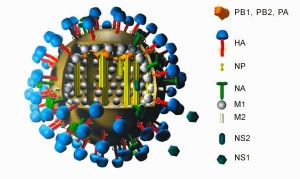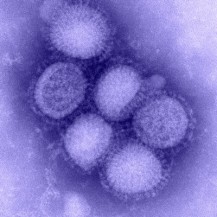
A cat in Iowa has caught H1N1 (swine flue), apparently from his people. He was treated by a vet and, happily, is recovering. He isn’t the first pet to get the H1N1 virus. Two ferrets also contracted the virus. Only one survived.
Don’t freak out! This is the only confirmed case where a cat has contracted H1N1 from humans, so it’s likely it’s NOT very common. You should take the same precautions with your pets that you should be taking anyway. Read what the CDC says about H1N1 and your pets:
What animals can be infected with the 2009 H1N1 virus?
In addition to humans, live swine and turkeys, we know that ferrets (which are highly susceptible to influenza A viruses) and a domestic cat have been infected with 2009 H1N1 virus. CDC is working closely with domestic and international public and animal heath partners to continually monitor this situation and will provide additional information to the public as it becomes available.
How do companion animals become infected with 2009 H1N1?
All available information suggests that the ferrets and domestic cat with 2009 H1N1 infections acquired the virus through close contact with ill humans. Transmission of 2009 H1N1 virus from humans to animals appears similar to human-to-human transmission
Can I get 2009 H1N1 influenza from my pet?
Available evidence suggests that transmission has been from ill humans to their companion animals. No evidence is available to suggest that animals are infecting humans with 2009 H1N1 virus.
What do I do if I am sick with flu-like symptoms and I have pets?
If you are sick with influenza-like-illness, take the same precautions with your pets that you would to keep your family and friends healthy:
- Cover your coughs and sneezes
- Wash your hands frequently
- Minimize contact with your pets until 24 hours after your fever is gone
What should I do if I suspect my pet has 2009 H1N1 influenza virus?
If members of your household have flu-like symptoms, and your pet exhibits respiratory illness, contact your veterinarian.
Is there a vaccine available for my pet?
Currently, there is not a licensed and approved 2009 H1N1 vaccine for companion animals. (There is a canine influenza vaccine, which protects dogs from the H3N8 canine flu virus, but it will not protect pets against the 2009 H1N1 virus and should not be used in any species other than dogs.)
How serious is this disease in companion animals?
Pet ferrets with naturally occurring 2009 H1N1 infection have exhibited illness similar in severity as seen with ferrets exposed to seasonal influenza viruses and 2009 H1N1 virus in laboratory settings, including sneezing, inactivity, and weight loss. The single confirmed cat exhibited respiratory illness and recovered with supportive care.
Additional Information
American Veterinary Medical Association
http://www.avma.org/public_health/influenza/new_virus/default.asp
United States Department of Agriculture
http://www.usda.gov/wps/portal/?navid=USDA_H1N1


